 From a distance, Andrea Faraday looks perfect: she is the junior class valedictorian at the exclusive Woodruff School, where she was voted Most Likely to Do Everything Right. But looks can be deceiving. When her parents disappear, her life—and her Perfect Girl charade—begins to crumble, and her scheme to put things right just takes the situation from bad to so much worse. Pretty soon she’s struck up the world’s least likely friendship with the juvenile delinquents at Justice Academy, the last exit on the road to jail—and the first stop on the way out.
From a distance, Andrea Faraday looks perfect: she is the junior class valedictorian at the exclusive Woodruff School, where she was voted Most Likely to Do Everything Right. But looks can be deceiving. When her parents disappear, her life—and her Perfect Girl charade—begins to crumble, and her scheme to put things right just takes the situation from bad to so much worse. Pretty soon she’s struck up the world’s least likely friendship with the juvenile delinquents at Justice Academy, the last exit on the road to jail—and the first stop on the way out.
Kimberly Reid’s YA novel Perfect Liars is an engrossing story that asks a big question: What makes someone a criminal? The discussion questions below, based on Perfect Liars, can help guide a conversation in classrooms about the juvenile justice system and its effects:
- In the beginning of the story, Drea has a strong independent streak, almost to the point of being aloof. Why does Drea struggle to make friends and to trust others? Why does her outlook change around friendship and camaraderie?
- How does Drea’s perception of adolescents in the juvenile justice system change?
- Why is Drea ashamed of how her family attained its privilege?
- What connection can be made between Damon’s choices (becoming a police officer) and Drea’s choices (in unrelenting pursuit of perfectionism) and the choices of their parents (being con artists)?
- Drea’s friends at the Justice Academy solve the problem with the very skills that led them to being in the juvenile justice system. What do you think the author, Kimberly Reid, wants readers to take away?
- Look up imposter syndrome and “Duck Syndrome.” Do either of these describe Drea’s experiences? Is her pursuit of perfectionism unique to Drea’s personality and internal pressures or are there systemic pressures as well? How might Drea’s gender contribute to her anxiety and stress in being perfect? Does Drea face additional pressures or unfair expectations to be successful because she is biracial in an elite, mostly white prep school?
- How are Drea and Xavier similar?
- Do Drea and Xavier see each other as equals? Why or why not?
- Examine the reasons that led to Gigi, Xavier, and Jason each being in the juvenile justice system. Do their actions define them as “bad” people? Does their involvement with Drea mean they are redeemed?
- Which characters do you particularly admire or dislike?
- Unlike the students Drea meets at Justice Academy, she has had access to elite institutions, privileged experiences, and influential people. Does Drea make the most of these resources?
- Drea strives to be independent and self-sufficient. Does she achieve the freedom she seeks? Why or why not?
- What impact do you think Drea’s experience in collaborating with the students at the Justice Academy might have on her view of her parents’ choices and lifestyle?
Purchase Perfect Liars here.
Read an interview with author Kimberly Reid.
 Amy Cheney is a librarian and advocate who currently runs the Write to Read Juvenile Hall Literacy Program in Alameda County, CA. She has over 20 years experience with outreach, program design, and creation to serve the underserved, including middle school non-readers, adult literacy students, adult inmates in county and federal facilities, students in juvenile halls, non-traditional library users and people of color.
Amy Cheney is a librarian and advocate who currently runs the Write to Read Juvenile Hall Literacy Program in Alameda County, CA. She has over 20 years experience with outreach, program design, and creation to serve the underserved, including middle school non-readers, adult literacy students, adult inmates in county and federal facilities, students in juvenile halls, non-traditional library users and people of color.
Cheney was named a Mover and Shaker by Library Journal, has won two National awards for her work, the I Love My Librarian award from the Carnegie Institution and New York Times, and was honored at the White House with a National Arts and Humanities Youth Program Award. Her six word memoir: Navigator of insanity, instigator of enlightenment. Her theme song is Short Skirt, Long Jacket by Cake.
Thank you for being with us, Amy! Let’s start with the basics: how would you describe your job, for someone who has no idea what you do?
Entrepreneur, innovator and relationship builder. But my overall job title would be Schlepper.
How did you become a librarian for incarcerated youth? Was it something you always knew you wanted to focus on, or did you begin your career with a different focus?
When I was a teen, a neighbor was friends with Maya Angelou, and they invited me to hear her speak in a church basement. I remember clearly not wanting to be there, and then as Maya Angelou spoke with such passion and intensity, I felt the hard armor around my heart begin to crack. I remember the struggle to hold onto what I thought was me, or at least my 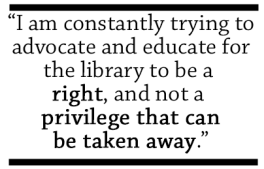 protection: the rage, indifference and sullenness. I recognized that if I was struggling with it, then I wasn’t a fundamentally hateful person. That was life changing for me. I felt such a deep connection with her as a result of this inner experience, I read every book she wrote as it was published.
protection: the rage, indifference and sullenness. I recognized that if I was struggling with it, then I wasn’t a fundamentally hateful person. That was life changing for me. I felt such a deep connection with her as a result of this inner experience, I read every book she wrote as it was published.
It took me a long time to realize that this experience is the basis of my passion for bringing in speakers and activities to stimulate the minds and hearts of those incarcerated. From Shakespeare to Cupcake Brown to Ishmael Beah to MK Asante (wonderfully, one of Maya Angelou’s protege’s), I see kids feel encouraged, enthusiastic and interested in a place that tends to dampen all of that.
In the 80’s I was a part of the anti-nuclear protests – when my friends were released from jail I was horrified to hear there were no books where they had been housed. I immediately started a book drive for the jail and that ultimately led to employment at the library serving those incarcerated in Alameda County.
What does your average day look like? Do you even have an “average day”?
Almost every day involves advocacy. Today one of the staff told me that going to the library was like a field trip, all the kids love it. But, she said, the girls had not “earned” a visit, so they couldn’t come. This didn’t make sense to me. I am constantly trying to advocate and educate for the library to be a right, and not a privilege that can be taken away. I am advocating for youth to be able to come here, as well as in general, advocacy for the youth, library, etc.
What kind of relationship with books do your students have? What kind of role do books play in their lives?
I think initially, many of them have a negative relationship with books and reading, and others have a non-existent relationship with them. Some students do have a positive relationship with reading before they come here, but there is a huge percentage—probably the majority—that start reading here and get excited about it and read more than they ever have in their life.
Regardless of their relationship to books and reading the library is a desired destination and activity. They are fully respected and acknowledged here. And the atmosphere is remarkably different from the rest of the facility. There are plants in here! And windows! And outside the window you can see trees and clouds and birds and grass! Real furniture and comfortable chairs! We play a game (Taboo) and laugh almost every library visit.
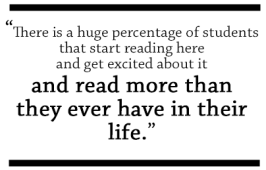 The majority of the kids here ultimately develop a positive relationship with books and reading. Books are a de-stressor, they are a life saver. In fact, the staff that call me the most, that request that I come down and talk to a kid or bring a kid a book, are the therapeutic staff. They also advocate with me for kids on suicide watch, etc. to be able to have a book. Today I went out and talked to a kid that has been under a blanket for hours if not days. He actually sat up and showed some life when I brought him some books.
The majority of the kids here ultimately develop a positive relationship with books and reading. Books are a de-stressor, they are a life saver. In fact, the staff that call me the most, that request that I come down and talk to a kid or bring a kid a book, are the therapeutic staff. They also advocate with me for kids on suicide watch, etc. to be able to have a book. Today I went out and talked to a kid that has been under a blanket for hours if not days. He actually sat up and showed some life when I brought him some books.
Are there any books that your students are scrambling for? What flies off your shelves?
The bottom line is a. anything with action, and b. something they can personally relate to. And c, it makes huge difference if the cover is dynamic. My job is to find those books that have the right combination of the above. It’s a constant part of my job. While there are a few authors
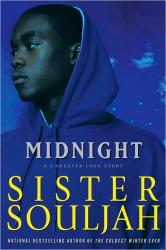 whose books I can’t keep on the shelf no matter what (Sister Souljah, Cupcake Brown, Tookie Williams, Coe Booth, Alison Van Diepen, Alan Sitomer), there are others whose books I work hard to bring to light. Right now as I look around I don’t see any of MK Asante’s Buck, for example. That’s an accomplishment: a cover with only words and no visuals isn’t something that in general attracts them. He visited here and so his book has taken off. He also stimulated the youth to read about their history, the history of rap music and books about the educational system in the US. Yah Hoo!
whose books I can’t keep on the shelf no matter what (Sister Souljah, Cupcake Brown, Tookie Williams, Coe Booth, Alison Van Diepen, Alan Sitomer), there are others whose books I work hard to bring to light. Right now as I look around I don’t see any of MK Asante’s Buck, for example. That’s an accomplishment: a cover with only words and no visuals isn’t something that in general attracts them. He visited here and so his book has taken off. He also stimulated the youth to read about their history, the history of rap music and books about the educational system in the US. Yah Hoo!
What kinds of books are allowed in a juvenile detention center? What kinds of books are not allowed?
In general, what is NOT allowed is anything that’s graphically sexual or violent or that outlines how to make a weapon or alcohol—something that would be a direct threat to the security of the institution.
What is “allowed” is a huge issue, and is one reason that we wanted to create a listserve, web page Library Services for Youth in Custody, and now the In the Margins book award. My hope is that the book award will lend legitimacy to our titles and hopefully enable more facilities to carry them. I am working with a facility right now that says, “Books must be limited in violence, sexually explicit material, promotion of drug or alcohol abuse and vampire stories.” It’s just bizarre the things people come up with to exclude and how they word and interpret it.
In my facility, I’ve made the choice not to advocate for “street lit” mainly because I think that 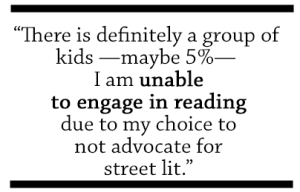 battle is too big to fight since I’m fighting for kids to get to the library. In addition, I spend a huge portion of my life finding books that I believe will work with both the authorities and the kids. Street Lit titles often do have a lot of violence and sex in them which is why I’ve chosen not to advocate for them – but it’s a hard choice every day, and one full of contradictions. There is definitely a group of kids – maybe 5% – I am unable to engage in reading due to my choice to not advocate for street lit.
battle is too big to fight since I’m fighting for kids to get to the library. In addition, I spend a huge portion of my life finding books that I believe will work with both the authorities and the kids. Street Lit titles often do have a lot of violence and sex in them which is why I’ve chosen not to advocate for them – but it’s a hard choice every day, and one full of contradictions. There is definitely a group of kids – maybe 5% – I am unable to engage in reading due to my choice to not advocate for street lit.
What do you wish people knew or understood about incarcerated youth?
They are super resourceful. They are caught in a trap not of their own making—poverty—and are punished for many of the things that I, and honestly, most of us did when teenagers. I am constantly amazed the privilege afforded the white middle class and what people of color and/or those from the poverty and working classes have to work extra hard for.
A recent example: Kareem, who is a college educated African American wrote me an email and then recalled it because of the typos. Meanwhile I wrote an email to the head of a very lucrative organization. My email was typed in lower case, and even had the phrase, “gratitude for all you do, dude.” I mean, not exactly thoughtful. Would anyone question that I was college educated? I doubt it. Kareem, and his beautiful, eloquent email with a few typos—he felt the need to correct it in order to present himself in the best possible light. It’s exhausting to constantly have to do that. And that is a *minor* incident.
There is so much policing and criminalization of poor youth and youth of color, I don’t think the majority of white middle class people really understand the depths of the inequity and the daily assaults. The juvenile hall (criminal justice system) is the crucible of race and class inequity in America.
Being in a detention facility, what unique limitations are you working with that a public or traditional school librarian might not be dealing with?
You know the supposed foundation of our country, that we are all innocent until proven guilty? For the most part, that’s not in operation here. There are a lot of unspoken power dynamics and struggles. When I’m in the living units I’m on the staff’s terms to a certain extent. When they are in the library, it’s more on my terms, but they always have the power to override me. It is definitely a dance.
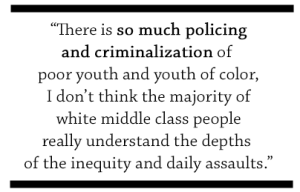 There is a completely different culture in a facility and if you don’t learn what the norms are you can’t be effective. There are unspoken rules and meanings. For example, kids walking down the hallway with their hands behind their backs are living there—on their way to court or medical. Kids walking with their hands by their sides are on their way out of the institution. There is a spoken language that is not used “on the outs” with phrases like, “the tone is high,” “live scan,” “pods,” “talking is dead,” and “prepare for transition.”
There is a completely different culture in a facility and if you don’t learn what the norms are you can’t be effective. There are unspoken rules and meanings. For example, kids walking down the hallway with their hands behind their backs are living there—on their way to court or medical. Kids walking with their hands by their sides are on their way out of the institution. There is a spoken language that is not used “on the outs” with phrases like, “the tone is high,” “live scan,” “pods,” “talking is dead,” and “prepare for transition.”
The biggest limitation is “security” issues. Those can run the gamut from restricted access to the internet or books on tape to candy, pencils, and envelopes, or even to students being prohibited from getting out of their chair on their own volition. Things that you would never imagine are security issues can be seen that way from a certain perspective (that I actually have come to understand on some level). These limitations force a creative response.
Are there any common misconceptions you’d like to correct about what you do?
I think the biggest misconception is that the kids are hard to work with. And I’m not saying they aren’t hard to work with. I’m also not saying we don’t have seriously disturbed and disturbing kids. But in actuality, it’s the entire toxic system of mass incarceration that’s hardest to work with. Finding your correct place in that toxicity is challenging, ever evolving, yet doable. The kids are the least of the problems.
Filed under:
Musings & Ponderings,
The Diversity Gap Tagged:
interview,
justice system,
juvenile justice,
libraries,
social justice,
Why I Love Librarians 

 From a distance, Andrea Faraday looks perfect: she is the junior class valedictorian at the exclusive Woodruff School, where she was voted Most Likely to Do Everything Right. But looks can be deceiving. When her parents disappear, her life—and her Perfect Girl charade—begins to crumble, and her scheme to put things right just takes the situation from bad to so much worse. Pretty soon she’s struck up the world’s least likely friendship with the juvenile delinquents at Justice Academy, the last exit on the road to jail—and the first stop on the way out.
From a distance, Andrea Faraday looks perfect: she is the junior class valedictorian at the exclusive Woodruff School, where she was voted Most Likely to Do Everything Right. But looks can be deceiving. When her parents disappear, her life—and her Perfect Girl charade—begins to crumble, and her scheme to put things right just takes the situation from bad to so much worse. Pretty soon she’s struck up the world’s least likely friendship with the juvenile delinquents at Justice Academy, the last exit on the road to jail—and the first stop on the way out.



 protection: the rage, indifference and sullenness. I recognized that if I was struggling with it, then I wasn’t a fundamentally hateful person. That was life changing for me. I felt such a deep connection with her as a result of this inner experience, I read every book she wrote as it was published.
protection: the rage, indifference and sullenness. I recognized that if I was struggling with it, then I wasn’t a fundamentally hateful person. That was life changing for me. I felt such a deep connection with her as a result of this inner experience, I read every book she wrote as it was published.



Thanks so much for this. Especially great to see which books really work for the kids and why, and interesting to see that a lot of them are authors who don’t get much attention elsewhere. Definitely adding a few books/authors to my to-read list from here!
This was very inspiring – you’ve given me something new to think about, possibly a new direction.
What an amazing interview, with such a thoughtful and intelligent advocate for incarcerated youth. I wonder, are Simone Elkeles’s books popular among the youth Amy works with? I saw Simone speak at the USBBY conference in October 2013 and she emphasized that her books are a big hit among boys in juvenile detention centers.
[…] Interview with a Librarian for Incarcerated Youth This interview with Cheney is incredibly inspiring – read it to become reacquainted with why we do what we do. “Amy Cheney is a librarian and advocate who currently runs the Write to Read Juvenile Hall Literacy Program in Alameda County, CA. She has over 20 years experience with outreach, program design, and creation to serve the underserved, including middle school non-readers, adult literacy students, adult inmates in county and federal facilities, students in juvenile halls, non-traditional library users and people of color. Cheney was named a Mover and Shaker by Library Journal, has won two National awards for her work, the I Love My Librarian award from the Carnegie Institution and New York Times, and was honored at the White House with a National Arts and Humanities Youth Program Award. Her six word memoir: Navigator of insanity, instigator of enlightenment. Her theme song is Short Skirt, Long Jacket by Cake.” –lisnews http://lisnews.org Read the entire article: https://www.eff.org/deeplinks/2014/04/futile-ban-twitter-has-been-liftedhttp://blog.leeandlow.com/2014/04/04/interview-with-a-librarian-for-incarcerated-youth/ […]
Here are a two things I was going to add to the article:
1. in terms of innocent until proven guilty It’s not in operation for people of color in general. In addition, in most juvenile halls the kids have not been adjudicated yet – meaning they have not been found responsible for any crime. Yet they are surely treated as if they are guilty.
2. In terms of “restricted internet use” – it’s more like zero to extremely limited access to Internet or books on tape – it’s way beyond restricted.
Alina – yes, Simone Elkeles is super, super popular. I almost included her in the list.